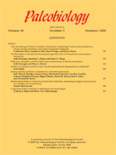
PALEOBIOLOGY
Scope & Guideline
Pioneering Research in the Evolution of Life
Introduction
Aims and Scopes
- Paleobiological Evolution and Diversity:
Research on the evolution of various organisms, focusing on their morphological changes, diversification patterns, and the ecological factors influencing these processes. - Paleoecology and Environmental Interactions:
Studies examining the interactions between ancient organisms and their environments, including biotic and abiotic factors that may have influenced past ecosystems. - Quantitative Methods in Paleobiology:
Utilization of quantitative approaches and models to analyze paleobiological data, including morphometrics, phylogenetic analysis, and statistical methods. - Taphonomy and Fossil Preservation:
Investigation into the processes affecting fossil preservation and how these processes impact our understanding of past life and environments. - Conservation and Modern Implications:
Linking paleobiological research with contemporary conservation efforts, particularly in understanding biodiversity loss and informing strategies for current ecosystems.
Trending and Emerging
- Quantitative and Computational Approaches:
An increasing trend towards using quantitative methods and computational models to analyze paleobiological data, reflecting a broader movement towards data-driven research in the sciences. - Interdisciplinary Research Linking Paleobiology and Conservation:
A growing emphasis on aligning paleobiological research with conservation efforts, particularly in understanding historical biodiversity patterns to inform current conservation strategies. - Evolutionary Developmental Biology (Evo-Devo):
Emerging interest in the relationship between evolution and developmental biology, particularly how developmental mechanisms influence evolutionary trajectories across geological timescales. - Paleoecological Modeling and Climate Change Studies:
Enhanced focus on modeling past ecosystems and their responses to climate change, providing insights into resilience and adaptation that are relevant to current environmental challenges. - Technological Innovations in Fossil Analysis:
The incorporation of new technologies such as machine learning and advanced imaging techniques to analyze fossil data and infer paleobiological patterns is on the rise, offering fresh perspectives on traditional research questions.
Declining or Waning
- Traditional Morphological Studies:
There has been a decline in purely descriptive morphological studies that do not incorporate quantitative analyses or evolutionary implications, as the field increasingly favors integrative approaches. - Single-Discipline Focused Research:
Research that focuses solely on paleontology without interdisciplinary integration is becoming less common, as there is a growing emphasis on collaborations with other scientific fields such as ecology, geology, and climate science. - Descriptive Taphonomy without Analytical Framework:
Studies that describe taphonomic processes without applying robust analytical frameworks or linking them to broader ecological or evolutionary questions are appearing less frequently.
Similar Journals
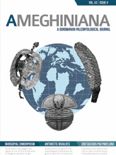
AMEGHINIANA
Fostering Innovative Research in Evolution and SystematicsAMEGHINIANA is a distinguished academic journal published by the ASOCIACION PALEONTOLOGICA ARGENTINA, serving as a vital platform for the dissemination of cutting-edge research in the fields of Ecology, Evolution, Behavior and Systematics, as well as Paleontology. With its ISSN 0002-7014 and E-ISSN 1851-8044, the journal has established itself as a key reference point for scholars seeking to explore the intricate relationships within ecological systems and the evolutionary history of species. Despite not offering open access, AMEGHINIANA maintains a reputation bolstered by a Q3 ranking in both its subject categories, underlining its sustained commitment to enhancing scientific knowledge. Researchers and professionals alike benefit from this journal’s extensive archive of studies dating back to 1985, with ongoing contributions expected until 2024. With a focus on high-quality content, this journal is essential for anyone immersed in the study of paleobiology and ecological systems.
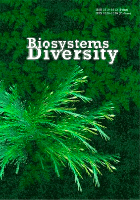
Biosystems Diversity
Unveiling the Secrets of Nature's DiversityBiosystems Diversity is an esteemed open access journal published by the Oles Honchar Dnipro National University since 2009, based in Ukraine. Focusing on a wide array of topics within the fields of Ecology, Evolution, Behavior, and Systematics, the journal aims to foster the dissemination of cutting-edge research and innovative methodologies in understanding biodiversity and ecological interactions. With its ISSN 2519-8513 and E-ISSN 2520-2529, Biosystems Diversity has seen a consistent growth trajectory, earning a Q3 category for Ecology and a Q4 classification for Ecology, Evolution, Behavior and Systematics as of 2023, reflecting its dedication to high standards of scholarly excellence. The journal's rankings in Scopus solidify its relevance in the academic community, providing researchers and practitioners with vital insights into contemporary environmental challenges. As it converges towards its 2024 target, Biosystems Diversity continues to empower scientists, students, and professionals alike to explore new dimensions in the study of biological systems, offering crucial open access options for broader reach and engagement.

REVISTA BRASILEIRA DE PALEONTOLOGIA
Uncovering the Past, Shaping the Future of PaleontologyREVISTA BRASILEIRA DE PALEONTOLOGIA (ISSN: 1519-7530, E-ISSN: 2236-1715) is a premier academic journal dedicated to the field of paleontology, published by the esteemed SOCIEDADE BRASILEIRA DE PALEONTOLOGIA. Operating under a Q3 quartile ranking in the 2023 Scopus statistics for Paleontology, this journal serves as a vital platform for researchers, professionals, and students to disseminate and engage with cutting-edge discoveries and methodologies in paleontological studies. With a broad scope that encompasses various aspects of Earth's historical life, REVISTA BRASILEIRA DE PALEONTOLOGIA provides an essential resource for the scientific community, particularly those based in Brazil and South America. The journal is committed to promoting rigorous research and fostering collaboration among scholars, ultimately contributing to advancements in the understanding of past biodiversity and extinction events. Its thoughtful curation of articles since 2010 ensures that it remains at the forefront of paleontological scholarship, despite its limited HIndex and open access options. This journal is a crucial asset for anyone looking to deepen their understanding of evolutionary processes that have shaped our planet.
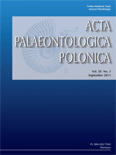
ACTA PALAEONTOLOGICA POLONICA
Championing Open Access in Paleontological ResearchACTA PALAEONTOLOGICA POLONICA is a leading scholarly journal in the field of paleontology, published by the Institute of Paleobiology, Polish Academy of Sciences. With its open access model established since 1956, the journal ensures that vital research related to Earth's history and the evolution of life is freely accessible to a global audience. Based in Warsaw, Poland, this journal has garnered a respectable impact within the academic community, currently positioned in the Q2 quartile of its field and ranking #47 out of 113 in Scopus for Earth and Planetary Sciences, reflecting its significance in advancing paleontological research. Covering a wide range of topics related to fossil studies and evolutionary biology, ACTA PALAEONTOLOGICA POLONICA serves as a crucial platform for researchers, professionals, and students alike, encouraging the dissemination of innovative ideas and discussions that contribute to our understanding of past life on Earth. As it continues to publish high-quality articles through to 2024 and beyond, this journal remains integral to the ongoing discourse in paleontological sciences.

PalZ
Exploring Evolutionary Journeys Through TimePalZ is a prestigious academic journal in the field of Paleontology, published by Springer Heidelberg in Germany. With a long-standing history that traces back to its converged years from 1914 to 2024, this journal offers invaluable insights into the evolutionary dynamics and ecological relationships of past life forms. Holding a commendable impact factor and ranked in the Q2 category of Paleontology, it consistently showcases high-quality research that resonates within the scientific community, evidenced by its Scopus rank of #38 out of 113 in Earth and Planetary Sciences. PalZ is committed to open access, ensuring that its rich repository of scholarly articles is readily accessible for researchers, professionals, and students alike. By engaging with the journal, readers will encounter cutting-edge studies that are pivotal for advancing our understanding of paleobiology and the historical patterns of biodiversity.
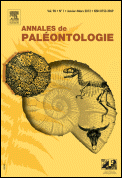
ANNALES DE PALEONTOLOGIE
Advancing Paleontological Knowledge, One Discovery at a TimeANNALES DE PALEONTOLOGIE is a distinguished academic journal published by MASSON EDITEUR that plays a pivotal role in the field of paleontology. With an ISSN of 0753-3969 and an E-ISSN of 1778-3666, this journal has been a vital resource since its inception in 1988, continuously contributing to the advancement of knowledge in Earth and Planetary Sciences, particularly focusing on paleontological research. Currently ranked #68 out of 113 in its category by Scopus, and celebrated for its Q2 quartile standing, ANNALES DE PALEONTOLOGIE publishes innovative studies, reviews, and discussions that appeal to a diverse audience of researchers, professionals, and students. The journal aims to foster a deeper understanding of paleontological phenomena and encourages interdisciplinary collaboration within the scientific community. Although it is not an open access journal, its commitment to scholarly excellence ensures that the content is highly regarded and widely referenced in academic circles. Situated in Issy-les-Moulineaux, France, it continues to maintain a global readership while promoting significant advancements in paleontological research.

STRATIGRAPHY AND GEOLOGICAL CORRELATION
Unveiling the Secrets Beneath Our FeetSTRATIGRAPHY AND GEOLOGICAL CORRELATION is a prominent scholarly journal published by PLEIADES PUBLISHING INC, featuring a dedicated focus on the fields of geology, stratigraphy, and paleontology. With ISSN 0869-5938 and E-ISSN 1555-6263, this journal has been disseminating significant research findings since its inception in 1994, continuously contributing to the academic discourse through 2024. Despite not currently offering open access, its relevance is underscored by its Category Quartiles for 2023, where it has established itself as Q3 in Geology and Paleontology, and Q2 in Stratigraphy. STRATIGRAPHY AND GEOLOGICAL CORRELATION ranks #29 out of 55 in Stratigraphy and #186 out of 321 in Geology according to Scopus metrics, positioning it within the competitive landscape of Earth and Planetary Sciences. Researchers, professionals, and students are invited to engage with the journal’s content to deepen their understanding and foster innovation within these critical areas of study.
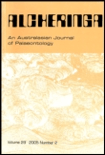
ALCHERINGA
Bridging Past and Present in Paleontology and BehaviorALCHERINGA, published by Taylor & Francis Ltd, is a distinguished academic journal that has been at the forefront of research in the fields of ecology, evolution, behavior, systematics, and paleontology since its inception in 1975. With an ISSN of 0311-5518 and E-ISSN 1752-0754, this journal serves as a critical platform for the dissemination of high-quality research, contributing significantly to the understanding of biological and geological sciences. Ranking in the Q3 quartile for both Ecology, Evolution, Behavior and Systematics, as well as Paleontology, ALCHERINGA is well-positioned within the academic community, attracting submissions from researchers across the globe. The journal's Scopus ranks further highlight its relevance, particularly its position in the 51st percentile for Ecology and the 50th percentile for Paleontology. Although it does not operate under an open access model, ALCHERINGA remains committed to providing valuable insights and fostering discussions that are essential for the advancement of these vital scientific disciplines. Researchers, professionals, and students are encouraged to explore the profound implications of the studies published within, making it an indispensable resource for anyone aiming to deepen their expertise in these fields.
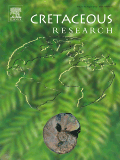
CRETACEOUS RESEARCH
Illuminating the Cretaceous Period's Rich TapestryCRETACEOUS RESEARCH, published by Academic Press Ltd - Elsevier Science Ltd, is a leading journal in the field of Paleontology that has established itself as an essential resource for researchers and professionals delving into the rich tapestry of the Cretaceous period. With its ISSN 0195-6671 and E-ISSN 1095-998X, this journal boasts a prestigious placement in the academic landscape, holding a Q1 rank in the 2023 Paleontology category and proudly positioned at 21st out of 113 in the Scopus ranking, reflecting its impact factor that places it in the 81st percentile. Since its inception in 1980, CRETACEOUS RESEARCH has facilitated a deeper understanding of prehistoric life and its evolutionary processes, covering topics such as fossil discoveries, paleoecology, and biostratigraphy. This journal best serves those seeking to expand their knowledge and contribute innovative findings to the scientific discourse surrounding the Cretaceous era. As it continues to converge into the future until 2025, it remains dedicated to providing an open platform for the dissemination of high-quality research that shapes our understanding of Earth’s geological past.
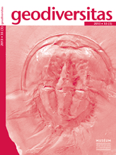
GEODIVERSITAS
Elevating Earth Science Discourse GloballyGEODIVERSITAS, an esteemed journal published by the Museum National d'Histoire Naturelle, represents a significant contribution to the fields of geology and paleontology. With an ISSN of 1280-9659, this peer-reviewed publication has established itself as a vital resource for researchers, professionals, and students alike, disseminating high-quality and innovative research since its inception in 2002. Covering a broad spectrum of topics within earth sciences, GEODIVERSITAS not only showcases cutting-edge studies but also fosters a deeper understanding of geological and paleontological phenomena. Ranked in the Q2 category of both geology and paleontology for 2023, the journal exemplifies rigorous scholarly standards and makes significant strides in enhancing knowledge within these disciplines. With its headquarters in Paris and a commitment to scientific excellence, GEODIVERSITAS stands as a leading voice in contemporary earth science research, inviting contributions that drive forward the conversation in geology and paleontology.